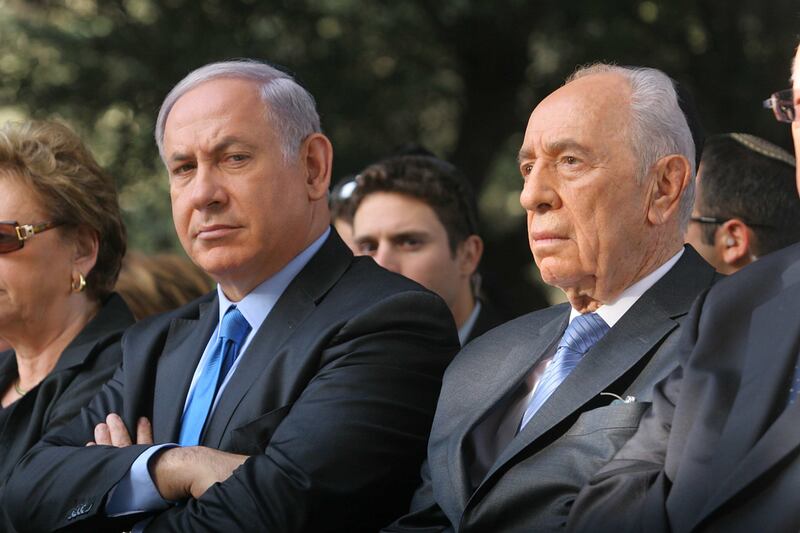The oddest odd couple in Israeli politics might just be Prime Minister Benjamin Netanyahu and President Shimon Peres, both of whom are in Washington this week for meetings with President Obama. Netanyahu is an unwavering skeptic with a deep devotion to Greater Israel, Peres a relentlessly optimistic peacenik. Yet for much of the past three years, Netanyahu had no bigger booster than Peres, who repeatedly vouched for him with foreign leaders and assured people he genuinely wants peace. Netanyahu, in return, allowed Peres a brief role in contacts with the Palestinians, though as president, his job description restricts him mostly to pomp and circumstance.
Now the honeymoon might be ending. People familiar with the relationship say tensions have bubbled to the surface in recent months over how to cope with Iran’s nuclear ambitions and what to offer the Palestinians. So much so that while Netanyahu is expected to tell Obama that Israel will take action on its own if sanctions against Iran don’t produce quick results—raising the specter of a regional war—Peres has different ideas. “When you see that the United States and Europe are taking steps [to prevent Iran from getting nuclear weapons] … that’s the way right now,” he told Newsweek in a recent interview in Jerusalem. “We don’t have to monopolize it.”
That Israel’s two most senior political figures don’t see eye to eye on the weightiest issues of the day is hardly unprecedented. Israel’s first prime minister, David Ben-Gurion, is said to have imbued the presidency with zero executive powers precisely to prevent his political rival, Chaim Weizmann, from having a role in the decision making. But it’s a reminder that even as Israel edges toward confrontation with Iran, in defiance of Washington, how to deal with the mullahs is the subject of fierce debate inside Israel—not just within the political establishment but also in the military and the intelligence community.
It’s also a reflection of Netanyahu’s diminished status among a certain group of politicians, public figures, and journalists who believed three years ago that Netanyahu would surprise everyone by striking a deal with Palestinian President Mahmoud Abbas. Peres is merely the latest member of the group to face disillusionment. “For a long time, Peres nurtured the hope that with his input and consultation, Netanyahu would be much more forthcoming and active in the peace process,” says David Landau, who has coauthored two books with Peres and sees him regularly. “But of late, Peres has given up that hope.”

The backstory of the bromance between Peres and Netanyahu is a complicated one. In 1996 the two had squared off in one of Israel’s most fiercely fought elections for prime minister, just months after a right-wing Jew murdered Israeli leader Yitzhak Rabin in a bid to halt the Oslo peace process. Peres succeeded Rabin, but then lost to Netanyahu by less than half a percentage point, leaving the Israeli left with the feeling that the assassin had won—and casting a dark cloud over the fate of the peace process. Yossi Beilin, who served as a member of Peres’s cabinet at the time, recalls feeling bereft, “really broken,” when results were announced. Yet he found Peres remarkably composed. He remembers overhearing Peres ask his wife on the phone that day what she was cooking. When the answer, chicken, came back, Peres gave her the standard response: I’ll be home for lunch.
The ability to rebound from defeat was vintage Peres, but he didn’t seem to harbor a grudge against Netanyahu, which surprised people around him. Peres is not above bad-mouthing political enemies—his decades-long rivalry with Rabin, a member of his own party, produced some seriously nasty invective. But people who know him say they’ve never heard him utter a bad word about Netanyahu, either after the election or in the years since. Landau attributes the courtesy to a certain reverence for Yoni Netanyahu, Benjamin’s brother, who was killed leading the daring rescue of hostages at Entebbe in 1976. Peres, who served as defense minister at the time, dispatched Yoni on the mission and carries the burden of effectively having signed his death warrant.
One way or another, Peres seems to have welcomed Netanyahu’s return to the prime minister’s office in 2009, even as members of the peace camp cringed. By then Peres had been serving as president for almost two years and was able to lend a hand by, among other things, smoothing early wrinkles in Netanyahu’s relationship with Obama. But the good will appears to have run out last September, when Netanyahu vetoed a meeting Peres was to have held with Abbas in Amman, Jordan. The two had met secretly on four previous occasions in what amounted to the most vigorous surge of diplomacy between Israelis and Palestinians in years. Netanyahu hoped the meetings would divert Abbas from petitioning the United Nations for membership, according to a source in Netanyahu’s inner circle, a move Israel feared would lead to its isolation. When Abbas pressed ahead with the U.N. initiative, Netanyahu terminated the Peres backchannel.
In the interview with Newsweek, Peres sidestepped questions about tensions with Netanyahu. At 88, Peres has more than a quarter century on the Israeli prime minister, a gap that seems to infuse even his frustrations with an avuncular spirit. But he did say repeatedly that giving time for sanctions against Iran to work was the right thing to do (Netanyahu has said the sanctions aren’t enough and has made clear to the Americans that Israel might launch airstrikes). He also said Obama appeared to have a “deep conviction” that Iran must not get the bomb, in contrast to the skepticism some people around Netanyahu express about the American president. “Let’s give the necessary time to see the effect of the economic sanctions,” he said in his Jerusalem office. “There is quite an important alliance to prevent it from happening [Iran developing nuclear weapons]. Give them a chance.”
About the prospects of an agreement with the Palestinians, Peres said the gaps were small, a characterization that is at odds with even the most upbeat assessments in the region. Israelis and Palestinians have not engaged in sustained talks in more than three years, the longest diplomatic drought since the start of the Oslo peace process in 1993. Most observers believe that both sides are moving away from an agreement that would resolve their conflict, not toward one.
But Peres is irrepressible as always. He says the setbacks are blips on a graph line that has mostly ascended since the ’70s and ’80s, when Israel and the PLO refused to even recognize each other. And he believes there’s no real alternative to the two-state solution if Israel wants to maintain its democratic character. Peres recently co-wrote a book with Landau about his mentor, Ben-Gurion. It concludes that Ben-Gurion’s greatest decision was accepting the United Nations partition plan, which gave Israel a state but much less territory than it sought. The book is a historical accounting from a man who worked under him for decades. But Landau says Peres also thinks of it as a contemporary tract. “He’s trying to deliver a message to people here and now that nothing has changed since Ben-Gurion’s decision,” Landau said. “In order to maintain a democratic country, Israel needs to forgo part of the territory.”






